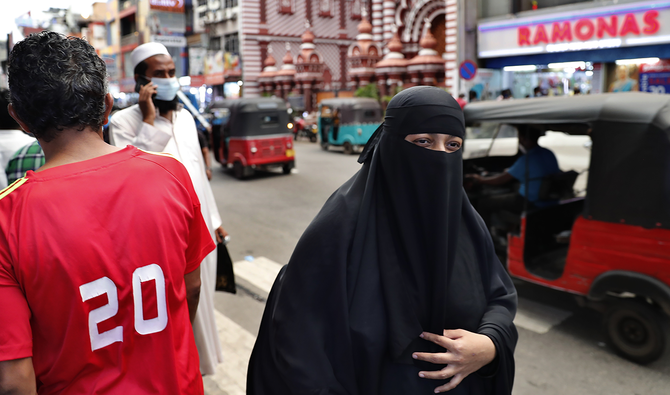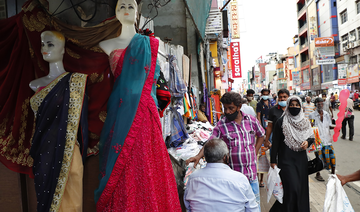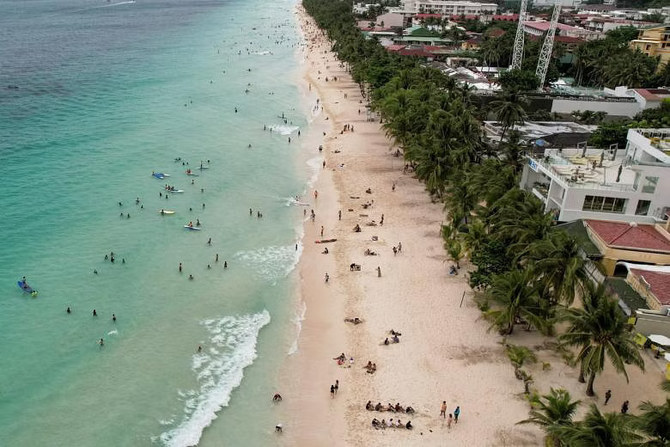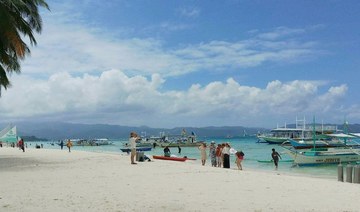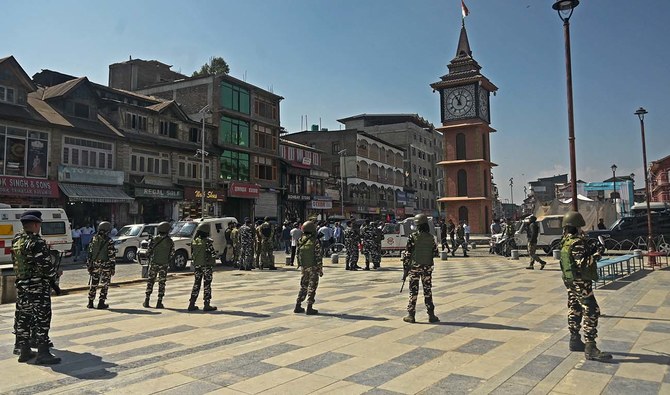COLOMBO: A draft bill that would outlaw full-face veils and body coverings for Muslim women in Sri Lanka will be tabled in parliament next month, a government official said on Wednesday, a day after the Cabinet cleared a proposal banning the burqa in public for national security reasons.
“The framework of the Cabinet decision taken on the burqa ban has been sent to the Attorney General’s department, and the bill is likely to be presented in the legislature within a month,” Public Security Minister Sarath Weerasekara told Arab News.
Last month, Weerasekara sought Cabinet approval to ban the burqa — an outer garment worn by some Muslim women to cover the body and face — calling it “a sign of religious extremism” with a “direct impact on national security.”
“The burqa has a direct impact on national security. It is a sign of religious extremism. Such actions will help maintain security. We will definitely ban it,” Weerasekara said at the time.
The proposal drew widespread criticism, with the government saying that Sri Lanka was in “no rush” to implement the ban, which required serious “consensus and consultations.”
A temporary ban on the burqa was imposed three years ago after the Easter Sunday bomb attacks, which killed 269 people and injured more than 500 in separate locations of Sri Lanka on April 21, 2019.
The island nation also plans to ban more than 1,000 Islamic seminaries, or madrasas, out of almost 2,300 institutions across the island, with Weerasekara saying they were either “not registered with the authorities” or failed to follow the national education policy.
Once implemented, the burqa ban would be the latest move affecting Sri Lanka’s minority Muslims, who make up nearly 10 percent of its total population of 22 million, where Buddhists account for 70 percent of the census.
Tuesday’s decision, which comes amid the government urging the public to wear face masks to prevent the spread of COVID-19, has elicited a mixed response from the Muslim community.
Hilmy Ahmed, vice president of the Sri Lanka Muslim Council, questioned the government’s “priorities,” at a time “when the whole world is asking people to cover their faces.”
“This has been the strategy of extremist/racist politicians to target the Muslim community hoping that they can divert the people’s attention from the daily crisis of unprecedented turmoil,” Ahmed told Arab News on Wednesday.
Others said it violates Muslim women’s right to freedom of religion.
“In terms of violating human rights, Sri Lanka is already under the watch list of UNHRC (UN refugee agency), and they continue to disrespect rights and principles. This time the burqa ban has violated the freedom of choice further,” Muheed Jeeran, an international human rights lobbyist and political analyst, told Arab News.
Women leaders said that the ban was a “gross violation of human rights.”
“Men and women should have a choice to wear dress that is not obscene in styles,” Marliya Sideek, a retired college principal and vice patron of the Young Women’s Muslim Association in Colombo, told Arab News on Wednesday.
“For security reasons, the veiled women can show their faces for identification purposes,” she added.
Others, such as Hussein Mohammed, former Sri Lankan ambassador in Saudi Arabia and president of the Islamic Center based in the capital city, Colombo, said that they agreed with the proposal.
“The government should allow hijab (head covering) and disallow the burqa or niqab (face covering),” Mohammed told Arab News.
Silmiya Yousuf, managing director of SY Productions, argued that there was “no reason to ban the burqa,” especially in the context of the Easter Sunday bombings, as “no one used a veil to carry out the attacks.”
“The extremist killers were showing their faces carrying backpacks during the attacks,” Yousuf said, adding that the ban could be “traumatic for Muslim women who would be forced to show their faces.”
Weerasekara said that the bill was neither anti-Islam nor anti-Muslim.
“We are taking this action only as a security measure to prevent undue actions or behavior making use of the veils,” the minister told Arab News.
Asked whether the burqa ban could limit Arab tourists from visiting the island, he added: “This is being done there as well due to security concerns. Sri Lanka has always been a Muslim-friendly country, and tourists from that region are most welcome.”
In the years preceding the pandemic, 71,636 tourists from the Gulf and the Middle East, with 50 percent from Saudi Arabia, visited the island nation, A. M. Jaufer, president of the Chamber of Tourism and Industry in Sri Lanka, told Arab News.



